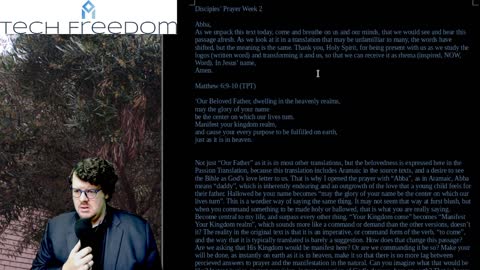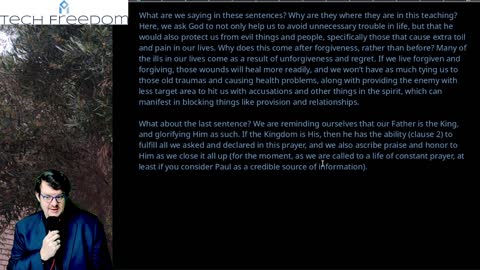
-
What else is around the Disciples' Prayer? What led to Jesus teaching on prayer, here?
 Spirituality and TechMatthew 6:5-8 Lord’s Prayer, Week 1: Intro context Father, As we approach the Disciples’ prayer today, help us to see this ever-so-familiar passage in fresh ways, help us to grasp the deep things in it, not just the simple, surface meaning. 5“Whenever you pray, be sincere and not like the pretenders who love the attention they receive while praying before others in the meetings and on street corners. Believe me, they’ve already received their reward. 6But whenever you pray, go into your innermost chamber and be alone with Father God, praying to him in secret. And your Father, who sees all you do, will reward you openly. 7When you pray, there is no need to repeat empty phrases, praying like the Gentiles do, for they expect God to hear them because of their many words. 8There is no need to imitate them, since your Father already knows what you need before you ask him. When the disciples asked Jesus how they should pray, this is how he started his teaching. Don’t try to focus attention on yourself as you pray (like the pharisees do). Instead, go as far from others as you can. Hide that you are praying, so that God will do the opposite and put you on blast for praying privately. Prayer is not meditation, muttering and murmuring repetitive phrases (like those who do not know God) will not cause God to respond more favorably to you. Be simple and to the point, because our Father knows what we need and desire before we ask. Be at peace. Speak your mind and your heart to the Lord. Even though He knows already, He likes to hear from each of us. Doesn’t that make you thankful? Even though He knows about all our needs and desires, He wants us to tell Him about them, if only to build relationship. Doesn’t that blow your mind? The God of the universe wants to hear from YOU.60 views
Spirituality and TechMatthew 6:5-8 Lord’s Prayer, Week 1: Intro context Father, As we approach the Disciples’ prayer today, help us to see this ever-so-familiar passage in fresh ways, help us to grasp the deep things in it, not just the simple, surface meaning. 5“Whenever you pray, be sincere and not like the pretenders who love the attention they receive while praying before others in the meetings and on street corners. Believe me, they’ve already received their reward. 6But whenever you pray, go into your innermost chamber and be alone with Father God, praying to him in secret. And your Father, who sees all you do, will reward you openly. 7When you pray, there is no need to repeat empty phrases, praying like the Gentiles do, for they expect God to hear them because of their many words. 8There is no need to imitate them, since your Father already knows what you need before you ask him. When the disciples asked Jesus how they should pray, this is how he started his teaching. Don’t try to focus attention on yourself as you pray (like the pharisees do). Instead, go as far from others as you can. Hide that you are praying, so that God will do the opposite and put you on blast for praying privately. Prayer is not meditation, muttering and murmuring repetitive phrases (like those who do not know God) will not cause God to respond more favorably to you. Be simple and to the point, because our Father knows what we need and desire before we ask. Be at peace. Speak your mind and your heart to the Lord. Even though He knows already, He likes to hear from each of us. Doesn’t that make you thankful? Even though He knows about all our needs and desires, He wants us to tell Him about them, if only to build relationship. Doesn’t that blow your mind? The God of the universe wants to hear from YOU.60 views -
Disciples' prayer Week 2: what is the key to this prayer?
 Spirituality and TechDisciples’ Prayer Week 2 Abba, As we unpack this text today, come and breathe on us and our minds, that we would see and hear this passage afresh. As we look at it in a translation that may be unfamilliar to many, the words have shifted, but the meaning is the same. Thank you, Holy Spirit, for being present with us as we study the logos (written word) and transforming it and us, so that we can receive it as rhema (inspired, NOW, Word). In Jesus’ name, Amen. Matthew 6:9-10 (TPT) ‘Our Beloved Father, dwelling in the heavenly realms, may the glory of your name be the center on which our lives turn. Manifest your kingdom realm, and cause your every purpose to be fulfilled on earth, just as it is in heaven. Not just “Our Father” as it is in most other translations, but the belovedness is expressed here in the Passion Translation, because this translation includes Aramaic in the source texts, and a desire to see the Bible as God’s love letter to us. That is why I opened the prayer with “Abba”, as in Aramaic, Abba means “daddy”, which is inherently endearing and an outgrowth of the love that a young child feels for their father. Hallowed be your name becomes “may the glory of your name be the center on which our lives turn”. This is a wordier way of saying the same thing. It may not seem that way at furst blush, but when you command something to be made holy or hallowed, that is what you are really saying. Become central to my life, and surpass every other thing. “Your Kingdom come” becomes “Manifest Your Kingdom realm”, which sounds more like a command or demand than the other versions, doesn’t it? The reality in the original text is that it is an imperative, or command form of the verb, “to come”, and the way that it is typically translated is barely a suggestion. How does that change this passage? Are we asking that His Kingdom would be manifest here? Or are we commanding it be so? Make your will be done, as instantly on earth as it is in heaven, make it so that there is no more lag between percieved answers to prayer and the manifestation in the natural. Can you imagine what that would be like? Instant justice, instant provision, instant execution of God’s decrees, here on earth? That is heavy. Would it change how you pray? That is the gravity of prayer. It is direct connection with Heaven, and our Father desires to give us the desires of our hearts (He placed them there to begin with). Sin has created lag time between heavenly answers and earthly manifestation, but it is incumbent upon us to push through resistance and the lag I mentioned, until, as beloved children, we receive that which we request.18 views
Spirituality and TechDisciples’ Prayer Week 2 Abba, As we unpack this text today, come and breathe on us and our minds, that we would see and hear this passage afresh. As we look at it in a translation that may be unfamilliar to many, the words have shifted, but the meaning is the same. Thank you, Holy Spirit, for being present with us as we study the logos (written word) and transforming it and us, so that we can receive it as rhema (inspired, NOW, Word). In Jesus’ name, Amen. Matthew 6:9-10 (TPT) ‘Our Beloved Father, dwelling in the heavenly realms, may the glory of your name be the center on which our lives turn. Manifest your kingdom realm, and cause your every purpose to be fulfilled on earth, just as it is in heaven. Not just “Our Father” as it is in most other translations, but the belovedness is expressed here in the Passion Translation, because this translation includes Aramaic in the source texts, and a desire to see the Bible as God’s love letter to us. That is why I opened the prayer with “Abba”, as in Aramaic, Abba means “daddy”, which is inherently endearing and an outgrowth of the love that a young child feels for their father. Hallowed be your name becomes “may the glory of your name be the center on which our lives turn”. This is a wordier way of saying the same thing. It may not seem that way at furst blush, but when you command something to be made holy or hallowed, that is what you are really saying. Become central to my life, and surpass every other thing. “Your Kingdom come” becomes “Manifest Your Kingdom realm”, which sounds more like a command or demand than the other versions, doesn’t it? The reality in the original text is that it is an imperative, or command form of the verb, “to come”, and the way that it is typically translated is barely a suggestion. How does that change this passage? Are we asking that His Kingdom would be manifest here? Or are we commanding it be so? Make your will be done, as instantly on earth as it is in heaven, make it so that there is no more lag between percieved answers to prayer and the manifestation in the natural. Can you imagine what that would be like? Instant justice, instant provision, instant execution of God’s decrees, here on earth? That is heavy. Would it change how you pray? That is the gravity of prayer. It is direct connection with Heaven, and our Father desires to give us the desires of our hearts (He placed them there to begin with). Sin has created lag time between heavenly answers and earthly manifestation, but it is incumbent upon us to push through resistance and the lag I mentioned, until, as beloved children, we receive that which we request.18 views -
Disciples' Prayer 3 - What Do Provision & Forgiveness Have to Do with Each Other?
 Spirituality and TechDisciples’ Prayer Week 3 Father, As we continue our journey in Jesus’ primer on prayer, help us to grasp what these phrases are really saying. Help us to take these truths to heart and live them. In Jesus’ name, Amen Matthew 6:11-12 (TPT) We acknowledge you as our Provider of all we need each day. Forgive us the wrongs we have done as we ourselves release forgiveness to those who have wronged us. This is a hard one for the “breadwinners” out there, the ones who work their butts off to put food on the table and roofs over their families’ heads, but your ability to work and the fact that you have a job or a functioning, growing business is not due to your efforts alone. God gave those things to you. He provided you with the heartbeats, breaths, strength, and drive to do what you do, along with the wisdom and favor from your clients and/or employer(s) to continue working with you/ to allow you to continue working for them. Let that pride go. Let your identity be in your status as a beloved child of God, not in what you do, much less how much you earn. The next thing is forgiveness. This is hard, almost harder than admitting that God is our ultimate provider. Why does Jesus condition our forgiveness from heaven on how we forgive our neighbors for things that they do which offend or hurt us? Why does this come after the affirmation that God is our provider? To answer the first question, I see it as an extension of God’s emphasis on our horizontal relationships. It goes along with Jesus’ teaching about when it is legitimate to give an offering at the temple. God wants us to be upright and handle our interpersonal issues in healthy ways before we even “go to church”. If there are any things we need to make right, in terms of forgiving one who has offended us. That doesn’t mean that they need to automatically need to be accepted into the “circle of trust”, just because you forgave them. It does mean that you do not hold whatever it is against them. That takes an exercise of will on our part, because it is often easier (more comfortable) to just nurse that grudge, but the truth is that you are only hurting yourself when you nurse a grudge. As to why it comes after we are told to affirm that God is our provider, forgiveness is ultimately a heavenly thing, as well. Forgiveness is divine, not human. So our role is to ask God for the grace to forgive those who wrong us, whether in reality or just our perceptions. Then with the provided grace we receive, it is incumbent on us to give it out in return, rather than hosting bitterness and resentment from hurts that eat us alive from the inside. As I said earlier, forgiveness does not mean that the offender gets a free pass back into the circle of trust, it simply means that you do not HAVE to carry that dead weight around so much. It is also a process and a choice, not simply a feeling. This is a much larger topic than I have space to cover here, so I think this is where I will leave it.3 views
Spirituality and TechDisciples’ Prayer Week 3 Father, As we continue our journey in Jesus’ primer on prayer, help us to grasp what these phrases are really saying. Help us to take these truths to heart and live them. In Jesus’ name, Amen Matthew 6:11-12 (TPT) We acknowledge you as our Provider of all we need each day. Forgive us the wrongs we have done as we ourselves release forgiveness to those who have wronged us. This is a hard one for the “breadwinners” out there, the ones who work their butts off to put food on the table and roofs over their families’ heads, but your ability to work and the fact that you have a job or a functioning, growing business is not due to your efforts alone. God gave those things to you. He provided you with the heartbeats, breaths, strength, and drive to do what you do, along with the wisdom and favor from your clients and/or employer(s) to continue working with you/ to allow you to continue working for them. Let that pride go. Let your identity be in your status as a beloved child of God, not in what you do, much less how much you earn. The next thing is forgiveness. This is hard, almost harder than admitting that God is our ultimate provider. Why does Jesus condition our forgiveness from heaven on how we forgive our neighbors for things that they do which offend or hurt us? Why does this come after the affirmation that God is our provider? To answer the first question, I see it as an extension of God’s emphasis on our horizontal relationships. It goes along with Jesus’ teaching about when it is legitimate to give an offering at the temple. God wants us to be upright and handle our interpersonal issues in healthy ways before we even “go to church”. If there are any things we need to make right, in terms of forgiving one who has offended us. That doesn’t mean that they need to automatically need to be accepted into the “circle of trust”, just because you forgave them. It does mean that you do not hold whatever it is against them. That takes an exercise of will on our part, because it is often easier (more comfortable) to just nurse that grudge, but the truth is that you are only hurting yourself when you nurse a grudge. As to why it comes after we are told to affirm that God is our provider, forgiveness is ultimately a heavenly thing, as well. Forgiveness is divine, not human. So our role is to ask God for the grace to forgive those who wrong us, whether in reality or just our perceptions. Then with the provided grace we receive, it is incumbent on us to give it out in return, rather than hosting bitterness and resentment from hurts that eat us alive from the inside. As I said earlier, forgiveness does not mean that the offender gets a free pass back into the circle of trust, it simply means that you do not HAVE to carry that dead weight around so much. It is also a process and a choice, not simply a feeling. This is a much larger topic than I have space to cover here, so I think this is where I will leave it.3 views -
Disciples' Prayer: unnecessary trials or tribulation?
 Spirituality and TechDisciples’ Prayer part 4 Matthew 6:13 (my translation/paraphrase) And do not lead us through trials (but around them), save us from evil (whether toils and pains or from people who are used by the devil). For the kingdom is Yours, and You are able, You have the glory, for all time, Amen. Father, Thank you for today. Thank you for this day of rest for many. Thank you that You are the King who rules with power and glory forever. Thank You that You have the ability to do all that we have asked in this prayer. Thank you that you have given us the ability to connect with You and to understand and apply Your Word in our lives. In Jesus’ name, Amen What are we saying in these sentences? Why are they where they are in this teaching? Here, we ask God to not only help us to avoid unnecessary trouble in life, but that he would also protect us from evil things and people, specifically those that cause extra toil and pain in our lives. Why does this come after forgiveness, rather than before? Many of the ills in our lives come as a result of unforgiveness and regret. If we live forgiven and forgiving, those wounds will heal more readily, and we won’t have as much tying us to those old traumas and causing health problems, along with providing the enemy with less target area to hit us with accusations and other things in the spirit, which can manifest in blocking things like provision and relationships. What about the last sentence? We are reminding ourselves that our Father is the King, and glorifying Him as such. If the Kingdom is His, then he has the ability (clause 2) to fulfill all we asked and declared in this prayer, and we also ascribe praise and honor to Him as we close it all up (for the moment, as we are called to a life of constant prayer, at least if you consider Paul as a credible source of information).4 views
Spirituality and TechDisciples’ Prayer part 4 Matthew 6:13 (my translation/paraphrase) And do not lead us through trials (but around them), save us from evil (whether toils and pains or from people who are used by the devil). For the kingdom is Yours, and You are able, You have the glory, for all time, Amen. Father, Thank you for today. Thank you for this day of rest for many. Thank you that You are the King who rules with power and glory forever. Thank You that You have the ability to do all that we have asked in this prayer. Thank you that you have given us the ability to connect with You and to understand and apply Your Word in our lives. In Jesus’ name, Amen What are we saying in these sentences? Why are they where they are in this teaching? Here, we ask God to not only help us to avoid unnecessary trouble in life, but that he would also protect us from evil things and people, specifically those that cause extra toil and pain in our lives. Why does this come after forgiveness, rather than before? Many of the ills in our lives come as a result of unforgiveness and regret. If we live forgiven and forgiving, those wounds will heal more readily, and we won’t have as much tying us to those old traumas and causing health problems, along with providing the enemy with less target area to hit us with accusations and other things in the spirit, which can manifest in blocking things like provision and relationships. What about the last sentence? We are reminding ourselves that our Father is the King, and glorifying Him as such. If the Kingdom is His, then he has the ability (clause 2) to fulfill all we asked and declared in this prayer, and we also ascribe praise and honor to Him as we close it all up (for the moment, as we are called to a life of constant prayer, at least if you consider Paul as a credible source of information).4 views


